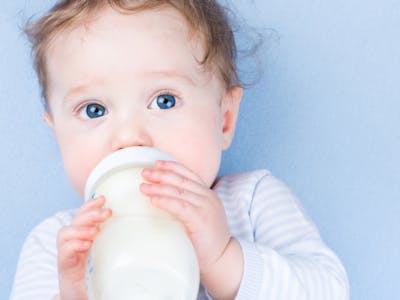buying guides
How to buy baby bottles and teats
This page contains affiliate links, which means we may earn a small amount of money if a reader clicks through and makes a purchase. All our articles and reviews are written independently by the Netmums editorial team.
There's lots of reasons why you might want to stock up on baby bottles and teats.
You might be exclusively bottle feeding your baby, or combining breast and formula feeds.
You might want to express the occasional bottle of milk so you can go out without your baby or get him used to taking a bottle, or moving on from breastfeeding at a later stage.
Whichever point you’re at, choosing the right bottle-feeding products can make the whole process easier for you both.
How much do baby bottles cost?
In general, there’s not a huge amount of variation in the prices of bottles and teats.
The cheapest are found in supermarkets and discount stores, where they can cost as little as £1 each, although these are very basic.
Most bottles cost around £4 to £6 each; these sometimes have additional features like anti-colic properties .
There are a couple of bottles that ring in at over £10, but they are designed to mimic babies' natural breastfeeding rhythm , hence the extra cost.
If you’d rather buy in bulk, multi-packs of bottles cost from around £10 to £30, depending on the type of bottle and how many are in the packet.
Bottles are generally sold with at least one teat, but if you need to buy extras, expect to pay £3 to £5 for a pack of two.
Baby bottle features
Choosing the right bottle for your baby is likely to be a matter of trial and error.
They come in two basic styles: standard neck and wide neck.
Wide-neck bottles are generally easier to fill, but you won’t be able to fit as many in your steriliser at once.
Many bottles are designed to reduce the symptoms of colic: unexplained crying in newborns that is often thought to be caused by tummy pain.
These have a vent or valve system that is meant to stop your baby swallowing air when he feeds, reducing wind and discomfort.
These are generally a little more expensive, however, and can be fiddlier to clean.
Baby bottles are either made of plastic or glass.
Since 2011, all plastic bottles should be free from a chemical called BPA, which has been linked with health and developmental problems in babies.
Plastic bottles are lighter, cheaper and more durable.
Some parents prefer to use glass bottles, which are more environmentally friendly but also more expensive.
You should start with a slow-flow teat for your newborn, and move up through the sizes as your baby gets older.
Bottles tend to come in two sizes: smaller ones for new babies, and larger ones for older babies.
They are often shaped to make them more like the breast, and easier to hold.
They come in a range of different colours, and sometimes with child-friendly designs.
Some bottles can also be used with sippy spouts and handles as you enter the weaning stage, which can help your baby make the transition from bottle to cup.
Teats for bottles come in a range of different sizes and styles.
They are made of silicone, which is more durable, or latex, which is more flexible but wears out more quickly.
You can either buy standard teats, or orthodontic teats, which are designed to fit the shape of your baby’s mouth more naturally, and to replicate the shape of the mother’s nipple, supposedly making it easier to combine breast and bottle feeding.
It’s important to make sure you buy the right size teat for your baby.
They generally come in slow, medium or fast flow versions.
You should start with a slow-flow teat for your newborn, and move up through the sizes as your baby gets older.
If he’s getting frustrated during feeds, or still seems hungry afterwards, it’s a sign that you need to move up to the next size teat.
On the other hand, if he’s gulping or spluttering, or if a lot of milk is leaking out of his mouth, the teat may be too fast for him, so you should go down a size.
Some teats have anti-colic valves that aim to reduce the amount of air your baby swallows. These may help if he struggles with wind and crying.
What else you need to know about baby bottles
It’s essential to check your baby’s feeding equipment regularly for signs of damage.
Cracks and scratches in bottles can create a breeding ground for bacteria, which can cause stomach upsets, while damaged teats could be a choking hazard if a piece breaks off in your baby’s mouth.
You can also buy self-sterilising bottles that you fill with water and put in the microwave, and even disposable bottles.
These types are both handy for travel but are only intended to be used a few times.
Checklist
-
Bottles come in different shapes and sizes, and finding the right one is likely to involve some trial and error.
-
Some bottles and teats have anti-colic functions to help ease wind and tummy pain.
-
Teats come in three sizes: slow, medium and fast flow. Young babies need slower-flowing teats
Read on:
- The best bottles for colicky babies
- The best bottles to mimic breastfeeding
- The best sterilisers for bottles and feeding gear

 '
'



